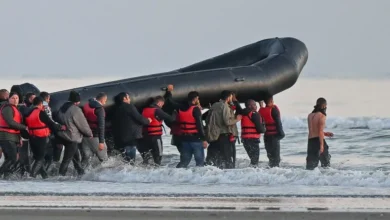Rights lawyers go to court to stop German arms deliveries to Israel

Human rights lawyers said on Friday they had filed an urgent appeal against Germany’s government to stop exports of war weapons to Israel, citing reasons to believe they were being used in ways violating international humanitarian law in Gaza.
A Dutch court has ordered the Netherlands to block all exports of F-35 fighter jet parts to Israel over concerns they were being used for attacks on civilian targets in the Israeli-besieged Gaza Strip, where tens of thousands have been killed.
Israel denies deliberately targeting civilians in the Gaza war, saying Hamas militants use residential areas for cover, which the Palestinian group denies.
The Berlin case, brought by several organizations including the European Legal Support Center (ELSC), Law for Palestine and the Palestine Institute for Public Diplomacy, was filed in an administrative court on behalf of Palestinians in Gaza.
In a statement, the lawyers said the arms deliveries and support Germany has provided to Israel violated the country’s obligations under the War Weapons Control Act.
They cited a January order from the International Court of Justice (ICJ) for Israel to take action to prevent acts of genocide in Gaza, which it has subjected to siege and invasion since Hamas’ October 7 attack. Israel denies genocide allegations.
“Just the assumption is sufficient – that the weapons are used to commit acts that violate international law – to revoke arms experts under the Act,” lawyer Ahmed Abed told a press conference on Friday in Berlin.
He said he expected a ruling within two to three weeks.
‘Political pressure’
German government spokesperson Christiane Hoffmann said she could not comment about the Berlin court case and whether Germany would suspend arms exports to Israel pending a ruling.
“The federal government generally examines each arms export individually and takes a number of factors into account, including human rights and humanitarian law,” she said when asked about the matter by reporters.
International law experts said the litigation was unlikely to be able to force a halt to such arms exports under administrative law, though could push Berlin to review its stance if evidence were provided.
“It could build up political pressure on the German government… to be more transparent and declare which arms it is planning to transfer or which arms it actually has transferred to Israel,” Max Mutschler, a senior researcher at the Bonn International Center for Conflict Studies, said.
Rights groups would have a better chance of success if they took the case to the ICJ in The Hague, said lawyer Holger Rothbauer, who successfully sued arms manufacturer Heckler & Koch over arms deliveries to Mexico in 2010.
“It seems to me that a (German) law to cover the case is missing,” Rothbauer told Reuters, saying only a party directly affected by an administrative decision could sue to stop it. The rights lawyers said they were acting on behalf of Gazans.
More than 33,000 Palestinians have been killed and 75,750 injured in Israel’s military offensive on Gaza since October 7, the Gaza health ministry said in an update on Friday.
With Gaza in ruins, and most of its 2.3 million population forced from their homes and relying on aid for survival, Israel faces rising calls from allies to halt the war and allow unfettered aid into the enclave, with critics saying governments should threaten to withhold military aid if it does not do so.
Since Hamas’ October assault on Israel that killed 1,200 people, according to Israeli tallies, Germany has been one of Israel’s staunchest allies alongside the United States, underlining its commitment to atonement for its perpetration of the World War Two Nazi Holocaust in which 6 million Jews died.
Last year, Germany approved arms exports to Israel worth a 326.5 million euros ($353.70 million), including military equipment and war weapons, a 10-fold increase compared with 2022, according to economy ministry data.










